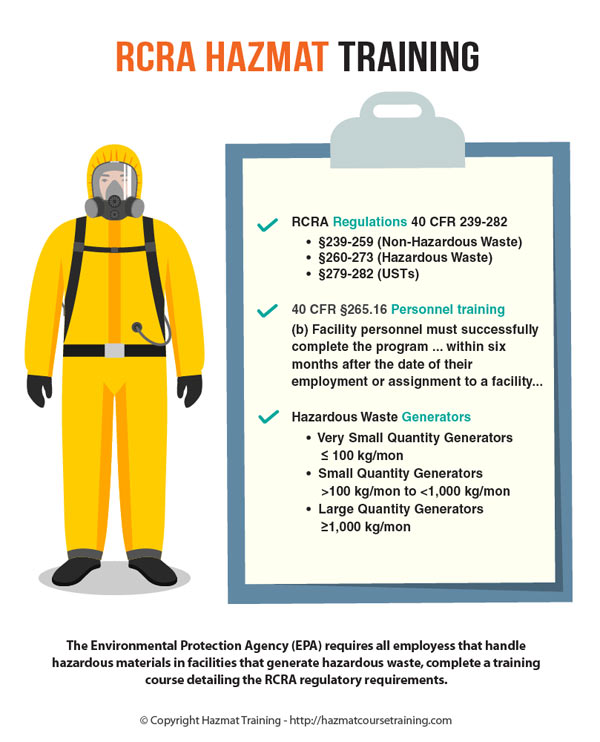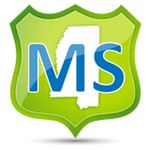Mississippi RCRA 8-hour Training & Certification
Mississippi RCRA 8hr Training & Annual Refresher Course
The Resource Conservation and Recovery Act (RCRA) is the federal law that creates the framework for the proper management of hazardous and non-hazardous solid waste. Under the RCRA, the Environmental Protection Agency (EPA) regulates hazardous waste to ensure these wastes are managed in ways that protect human health and the environment.
RCRA Hazardous Waste Management Training Required
The EPA requires RCRA training for “personnel” [40 CFR 260.10 - Definitions] or "all persons who work at, or oversee the operations of, a hazardous waste facility, and whose actions or failure to act may result in noncompliance" - must complete RCRA training within 6 months of initial hire - and take an 8 hour refresher training course annually [40 CFR 265.16(b) and (c)].
- 40 CFR §265.16 Personnel training.
- (a) (1) Facility personnel must successfully complete a program ... that teaches them to perform their duties in a way that ensures the facility's compliance with the requirements of this part.
- (b) Facility personnel must successfully complete the program required in paragraph (a) of this section within ... six months after the date of their employment or assignment to a facility, or to a new position at a facility, whichever is later. Employees hired after the effective date of these regulations must not work in unsupervised positions until they have completed the training requirements of paragraph (a) of this section.
- (c) Facility personnel must take part in an annual review of the initial training required in paragraph (a) of this section.
Employers should train all personnel that handle hazardous waste so they are able to properly recognize and manage hazardous wastes in order to identify situations that could cause releases and react quickly to prevent or stop spills.
Mississippi RCRA Hazardous Waste Training Course Info
- RCRA 8 hour
- Course Library
- RCRA Resources
- RCRA Regulations
RCRA Training & Annual Refresher – 8hrs
Description: The RCRA Hazardous Waste Training & Annual Refresher course instructs hazardous material professionals in the proper management of hazardous waste (generation, transportation, treatment, storage or disposal) and its effects on the environment in compliance with the Resource Conservation and Recovery Act (RCRA) regulations.
The Environmental Protection Agency (EPA) requires all employees that handle hazardous materials in facilities that generate hazardous waste, complete a training course detailing the RCRA regulatory requirements.
After completing the initial training course, hazardous material professionals are mandated to complete an annual refresher to keep current on the extensive regulatory requirements.
Duration: 8 hours
Pre-Requisites: None
Intended Audience
This course is intended for:
- Personnel involved in the handling, shipping, or receiving hazardous materials, including samples of hazardous waste; and
- Personnel involved in the management of hazardous wastes. This may include engineers; scientists; geologists; facility personnel; field technicians; samplers; drillers; laboratory technicians; and shipping/receiving personnel.
Learning Objectives
At the conclusion of this course, you will be able to:
- Explain the importance of RCRA regulations in managing hazardous wastes.
- Describe the standards used for different types of hazardous waste treatment, storage, and disposal facilities.
- Implement hazardous waste management systems to achieve and maintain compliance.
- Discuss the financial assurance requirements for corrective actions under RCRA.
- Discuss a manifest system including discrepancies, unmanifested waste, and operating records.
- Identify requirements for the monitoring, recordkeeping, and closure procedures of hazardous waste.
- Properly identify hazardous wastes according to RCRA regulations.
- Discuss the elements of a waste management system for municipal solid waste and industrial waste.
Lessons
- History of the RCRA Law
- Solid Waste, Hazardous Waste, and Recycling
- Summary of Regulations for Generators of Hazardous Waste and TSDFs
- Generator Regulations
- Transporter Requirements
- RCRA (Hazardous Waste Operations and Emergency Response)
- Incinerators, Boilers, and Industrial Furnaces
- RCRA Air Emission Standard
- TSD Facility Requirements
- Used Oil Management
- Land Disposal Restrictions
- Underground Storage Tanks
Module Quizzes and Final Exam
All module quizzes require a score of 70% to proceed forward in the course. The exam will test your knowledge on information covered throughout the course. You must make a score of at least 70% to pass this course. You will be given up to three opportunities to pass each quiz and the final exam. If you do not pass after three tries, you will be locked out of this course will no longer be able to take your Outreach training in an online format.
Course Completion Certificate
Upon successful completion of the course, you will receive a printable certificate of completion which is recognized as official documentation of training.
Hazmat & Environmental Safety Course Library
We offer a comprehensive library of hazmat and environmental safety courses to fulfill all your compliance training needs. View Course Library
- RCRA in Day to Day Operations – 2hrs: Enroll in Course
This course covers hazardous waste generators, containers, and the hazardous waste management plan - with the goals of handling hazardous waste in a safe, efficient, and environmentally sound manner - to comply with RCRA regulations. - RCRA: What the Law Requires – 4hrs: Enroll in Course
This course explains the history of the Resource Conservation and Recovery Act (RCRA), its structure, and its key elements that provide the framework for the EPA's comprehensive waste management program. The course also discusses the specific requirements of various types of facilities that treat, store, transport or dispose of hazardous waste. - Identifying Your Hazardous Wastes - 4hrs: Enroll in Course
This course covers identification of hazardous wastes, characteristics of hazardous wastes, and universal and miscellaneous wastes according to RCRA regulations. This course also discusses discarded material and excluded hazardous wastes in details and the Toxic Substance Control Act (TSCA) regulations in details. - Spill Prevention and Release Reporting - 2hrs: Enroll in Course
This course presents in-depth instruction on current SPCC regulations, contingency plans, facility response plan, and reporting requirements to help prevent oil spills that could reach waters or adjoining shorelines. - Stormwater Discharges and Permits in Construction - 2hrs: Enroll in Course
This course covers federal and state regulations to control and prevent stormwater discharge, specifically: general permit requirements, sources of stormwater discharge from industrial facilities, the EPA multi-sector general permit (MSGP), the impact of Municipal Separate Storm Sewer System (MS4) permits, the phases of and exclusions from the NPDES stormwater program, and best practice case studies. - Environmental Compliance Package - 14hrs: Enroll in Course
This training package contains 5 courses: 1. Identifying Your Hazardous Wastes (4hrs); 2. RCRA in Day-to-Day Operations (2hrs); 3. Stormwater Discharges and Permits in Construction (2hrs); 4. The Clean Air Act (1.5hrs); 5. The Clean Water Act and Day-to-Day Requirements (4hrs)
- Certified Environmental Specialist - 24hrs: Enroll in Course
This comprehensive training packagee covers federal regulations for environmental professionals and provides the requisite knowledge and understanding of EPA regulations relating to hazardous wastes such as the Clean Air Act (CAA), Clean Water Act (CWA), SPCC Rule, RCRA, EPCRA, TSCA, and CERCLA.
RCRA Regulations
The RCRA regulations are contained in Title 40 of the Code of Federal Regulations (CFR) – Protection of Environment: Parts 239-282 (See below).
In every state, the EPA or the state’s hazardous waste regulatory agency enforces hazardous waste laws. The EPA encourages states to assume primary responsibility for implementing a hazardous waste program through state adoption, authorization and implementation of the regulations.
- 40 CFR Parts 239-282 - RCRA Regulations
- 40 CFR Parts 239-259 - (Non-Hazardous Waste) Regulations for solid waste.
- 40 CFR Parts 260-273 - (Hazardous Waste) Regulations governing hazardous waste identification, classification, generation, management and disposal.
- 40 CFR Part 262 - Generators
- 40 CFR Part 263 - Transporters
- 40 CFR Parts 264-65 - Treatment, Storage, and Disposal (TSD) Facilities
- 40 CFR Parts 278-282 (Underground Storage Tanks) Regulations for managing used oil and standards for underground storage tanks.
Non-Hazardous Waste
40 CFR Parts 239-259 contain the regulations for solid non-hazardous waste:
- Part 239 – Requirements For State Permit Program Determination Of Adequacy
- Part 240 – Guidelines For The Thermal Processing Of Solid Wastes
- Part 243 – Guidelines For The Storage And Collection Of Residential, Commercial, And Institutional Solid Waste
- Part 246 – Source Separation For Materials Recovery Guidelines
- Part 247 – Comprehensive Procurement Guideline For Products Containing Recovered Materials
- Part 254 – Prior Notice Of Citizen Suits
- Part 255 – Identification Of Regions And Agencies For Solid Waste Management
- Part 256 – Guidelines For Development And Implementation Of State Solid Waste Management Plans
- Part 257 – Criteria For Classification Of Solid Waste Disposal Facilities And Practices
- Part 258 – Criteria For Municipal Solid Waste Landfills
- Part 259 [Reserved]
Hazardous Waste
40 CFR Parts 260-273 contain the regulations governing hazardous waste identification, classification, generation, management and disposal:
- Part 260 – Hazardous Waste Management System: General
- Part 261 – Identification And Listing Of Hazardous Waste
- Part 262 – Standards Applicable To Generators Of Hazardous Waste
- Part 263 – Standards Applicable To Transporters Of Hazardous Waste
- Part 264 – Standards For Owners And Operators Of Hazardous Waste Treatment, Storage, And Disposal Facilities
- Part 265 – Interim Status Standards For Owners And Operators Of Hazardous Waste Treatment, Storage, And Disposal Facilities
- Part 266 – Standards For The Management Of Specific Hazardous Wastes And Specific Types Of Hazardous Waste Management Facilities
- Part 267 – Standards For Owners And Operators Of Hazardous Waste Facilities Operating Under A Standardized Permit
- Part 268 – Land Disposal Restrictions
- Part 270 – EPA Administered Permit Programs: The Hazardous Waste Permit Program
- Part 271 – Requirements For Authorization Of State Hazardous Waste Programs
- Part 272 – Approved State Hazardous Waste Management Programs
- Part 273 – Standards For Universal Waste Management
Underground Storage Tanks
40 CFR Parts 279-282 contain the regulations for managing used oil and standards for underground storage tanks:
- Part 279 – Standards For The Management Of Used Oil
- Part 280 – Technical Standards And Corrective Action Requirements For Owners And Operators Of Underground Storage Tanks (UST)
- Part 281 – Approval Of State Underground Storage Tank Programs
- Part 282 – Approved Underground Storage Tank Programs
- Parts 283 to 299 [Reserved]
Mississippi RCRA Training
The EPA requires annual training for hazardous waste facility personnel and has complex RCRA hazardous waste rules to protect personnel, prevent releases, and avoid costly penalties.

Mississippi RCRA Hazardous Waste Management Training Requirements
The EPA requires RCRA training for “personnel” [40 CFR 260.10 - Definitions] or "all persons who work at, or oversee the operations of, a hazardous waste facility, and whose actions or failure to act may result in noncompliance" - must complete RCRA training within 6 months of initial hire - and take an 8 hour refresher training course annually [40 CFR 265.16(b) and (c)].
- 40 CFR §265.16 Personnel training.
- (a) (1) Facility personnel must successfully complete a program ... that teaches them to perform their duties in a way that ensures the facility's compliance with the requirements of this part.
- (b) Facility personnel must successfully complete the program required in paragraph (a) of this section within ... six months after the date of their employment or assignment to a facility, or to a new position at a facility, whichever is later. Employees hired after the effective date of these regulations must not work in unsupervised positions until they have completed the training requirements of paragraph (a) of this section.
- (c) Facility personnel must take part in an annual review of the initial training required in paragraph (a) of this section.
Employers should train all personnel that handle hazardous waste so they are able to properly recognize and manage hazardous wastes in order to identify situations that could cause releases and react quickly to prevent or stop spills.
Very Small Quantity Generators
- Hazardous Waste Generated - Quantity Limits: = 100 kg/month, and = 1 kg/month of acute hazardous waste, and = 100 kg/month of acute spill residue or soil.
- RCRA Training: Training not mandatory - but recommended so employees can recognize and properly manage hazardous wastes and prevent spills.
- 40 CFR 260.14
Small Quantity Generators
- Hazardous Waste Generated - Quantity Limits: >100 kg/month and <1,000 kg/month
- RCRA Training: Basic RCRA training required.
- 40 CFR 262.16 (b)(9)(iii)
- (iii) The small quantity generator must ensure that all employees are thoroughly familiar with proper waste handling and emergency procedures, relevant to their responsibilities during normal facility operations and emergencies.
Large Quantity Generators
- Hazardous Waste Generated - Quantity Limits =1,000 kg/month, or >1 kg/month of acute hazardous waste, or >100 kg/month of acute spill residue or soil
- RCRA Training: Full RCRA training Required
- 40 CFR 262.17(a)(7)
- (7)Personnel training.
- (i)(A) Facility personnel must successfully complete a program of classroom instruction, online training (e.g., computer-based or electronic), or on-the-job training that teaches them to perform their duties in a way that ensures compliance with this part.
- (C) At a minimum, the training program must be designed to ensure that facility personnel are able to respond effectively to emergencies by familiarizing them with emergency procedures, emergency equipment, and emergency systems, including where applicable:
- (1) Procedures for using, inspecting, repairing, and replacing facility emergency and monitoring equipment;
- (2) Key parameters for automatic waste feed cut-off systems;
- (3) Communications or alarm systems;
- (4) Response to fires or explosions;
- (5) Response to ground-water contamination incidents; and
- (6) Shutdown of operations.
- (iii)Facility personnel must take part in an annual review of the initial training required in paragraph (a)(7)(i) of this section.
Reference: EPA: Categories of Hazardous Waste Generators
Mississippi Environmental Agency & Hazardous Waste Program
The Mississippi Department of Environmental Quality (MDEQ) is the state government agency responsible for the enforcement of environmental policy within the State.
The MDEQ - Hazardous Waste Management Program is the division responsible for the management of hazardous waste within the State.
The rules and laws for the management of hazardous waste are found on the MDEQ - Hazardous Waste Management Program - Hazardous Waste Regulations page.
Mississippi Occupational & Labor Safety State Agency
Mississippi is not a “state-plan” state; that is, it does not have a federally approved occupational safety and health program. Consequently, occupational safety and health in the private sector workplace is governed by the federal Occupational Safety and Health (OSH) Act. There is no state law that governs workplace safety in the public sector (state and local agencies, school systems). Source: OSHA Directorate of State Plans
The Mississippi State University - Center for Safety and Health (CSH) is the U.S. Department of Labor, Occupational Safety and Health Administration (OSHA) consultation program for Mississippi. The purpose of the CSH is to provide assistance to the employers or managers of small and medium size high-hazard businesses in Mississippi by helping them come into compliance with the regulations of OSHA.
The Center for Safety and Health (CSH) services include the Safety and Health Achievement and Recognition Program, or SHARP. SHARP recognizes employers who have exemplary safety and health programs and exempts them from OSHA's general scheduled inspections.
Mississippi SOII
U.S. Department of Labor - Bureau of Labor Statistics
61 Forsyth Street, SW - Room 7T50
Atlanta, GA 30303
Phone: 404-893-8339
Mississippi CFOI
Mississippi State Department of Health
P.O. Box 1700
Jackson, MS 39215-1700
Phone: 601-206-8247
Web: http://www.msdh.state.ms.us/
State Reporting:
- SOII - Workplace Nonfatal Injuries and Illnesses: State nonfatal occupational injuries and illnesses data (SOII) are not available for Mississippi.
- CFOI - Workplace Fatalities
Mississippi RCRA Compliance Training
Mississippi RCRA compliance training is required for RCRA hazardous waste facility personnel (40 CFR 265.16) which covers the proper management of hazardous waste (generation, transportation, treatment, storage or disposal) for hazardous waste generators (40 CFR 260-279).
Disclaimer: The information presented on this website has been compiled from Federal and State sources and documents believed to be reliable and represent the best professional judgment of Hazmat Training. The accuracy of the information, however, is not guaranteed, nor is any responsibility assumed or implied, by us, and/or any other individual or entity assopciated with Hazmat Training, as applicable for any damage or loss resulting from inaccuracies or omissions. Contact federal or state agency staff to verify information.


